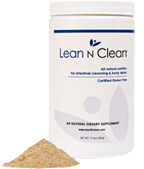Lean N Clean® Directions For Use
IF you are suffering from chronic Constipation diverticulitis IBS hemorrhoids, Crohn’s Disease, Celiac Disease, acne, overall fatigue, you have found the natural/safe remedy-Lean N Clean®. Here is how you should prepare it:
Shake bottle (with lid closed) to loosen powder before measuring. Adults use Lean N Clean® twice daily in between meals, on an empty stomach. To allow for proper digestion and absorption, take Lean N Clean at least 2 hours before or after a meal, medications, or vitamins.
- Pour 16 oz. of plain water into a tall glass.
- Add one level scoop (or 2 level tsp) of Lean N Clean on top and stir briskly until all powder clumps are broken up.
- May sweeten to taste with agave nectar or Stevia. May also mix a combination of water with fruit or vegetable juice (with no added sugar/corn syrup).
- Drink immediately or as soon as you can, otherwise the mixture will gel up.

- IMPORTANT: Must drink additional 8-16 oz. of plain water immediately after drinking Lean N Clean®.
Do not mix with protein powder, nut butter, milk/dairy products, or hot water, as these can cause constipation.
NOTE: Lean N Clean is not intended for use by children or pregnant/nursing women. Please consult your doctor before taking any new dietary supplements, including Lean N Clean.
How long does it take for Lean N Clean® to work?
We are often asked how long it takes for Lean N Clean® to work, and unfortunately there is no simple answer to this question. What we can say is that it is different for everyone due to several factors including diet, lifestyle, and prescription medications for existing issues.
People are often in so much pain that they want immediate relief from their symptoms and get disappointed when it doesn’t happen. Just as it normally takes time for issues in our bodies to develop, so too does it take time to heal them. When symptoms appear seemingly out of nowhere, we often dismiss the possibility that they may have gone untreated or undiagnosed for a long time before showing up. If you are compelled to try Lean N Clean® hoping for immediate relief, you may be disappointed. While some people do experience relief within 1-2 days taking the product twice per day, we don’t advertise that it will work that fast for everyone.
Think of it this way. If you decided to eat healthier and exercise with the goal of losing 20lbs, would you expect it to happen within a day or two? How about a week? Probably not. However, if your expectations are in line with what it takes a normal person to lose 20lbs in a healthy way, you would probably be willing to give it 30 days to realistically work. This is why we ask that you take Lean N Clean® twice per day for 30 days. Give it time to work on healing at the source of toxicity in the body, the gastrointestinal tract. If after this time you feel that it hasn’t met your expectations, we’ll refund your money, no questions asked.
DISCLAIMER: Individual result may vary.
Products
Lean N Clean®
Digestive Issues
- Diverticulitis
- Crohn’s Disease
- Celiac Disease
- Irritable Bowel Syndrome (IBS)
- Constipation
- Hemorrhoids
- Acne Cure and Prevention
- Bad Breath Cure and Prevention
- How to Regulate Your Bowel
Cleansing Benefits
Digestive Health
- Visit www.acidgone.com to learn about our Acid Reflux/GERD/heartburn- product- Acidgone®
- Read About How You Can Avoid Being a Willing Medical Victim on willingmedicalvictims.org
- Are you an independent thinker? Share your important thoughts to benefit humanity on debateandshare.com

